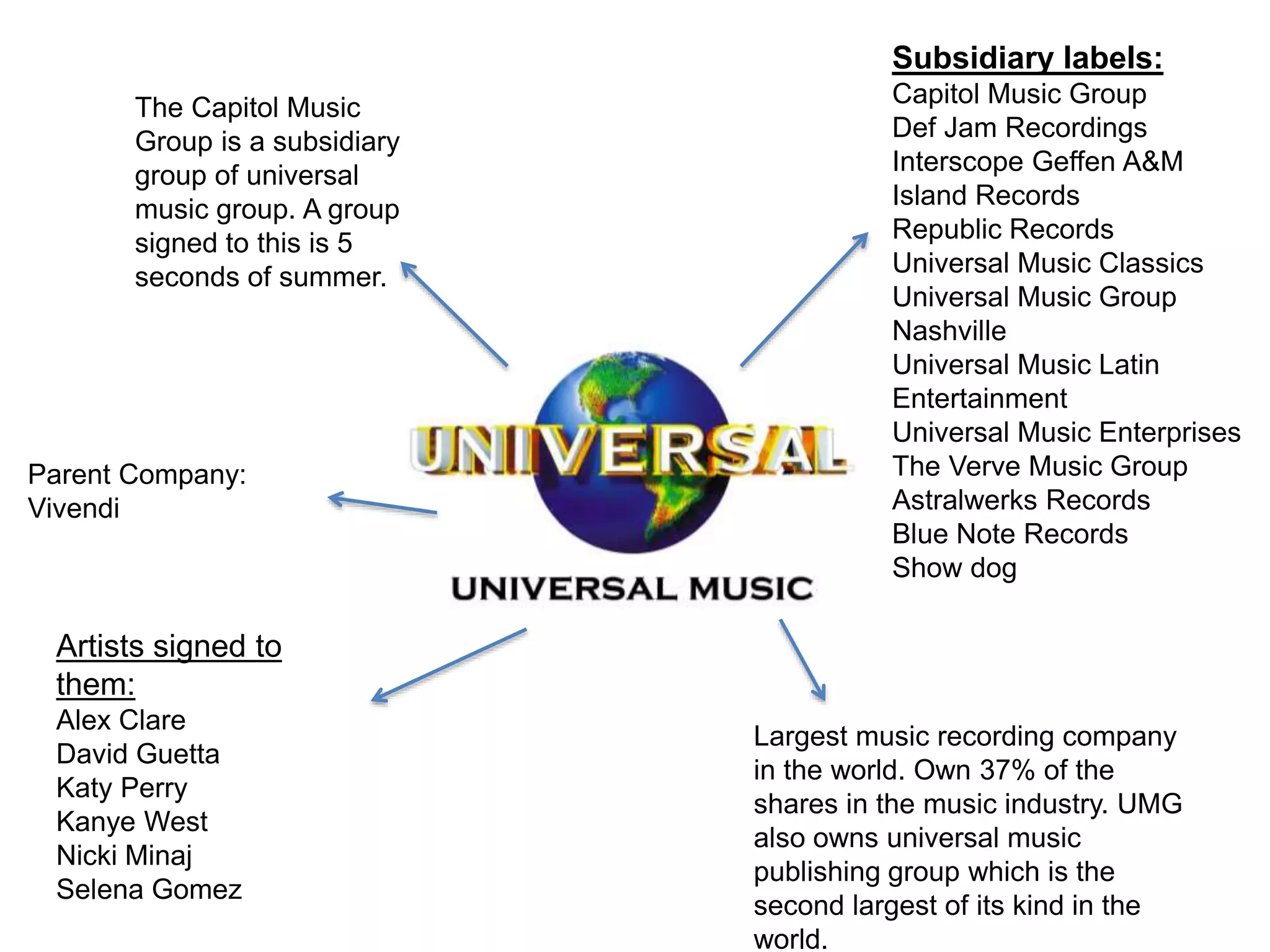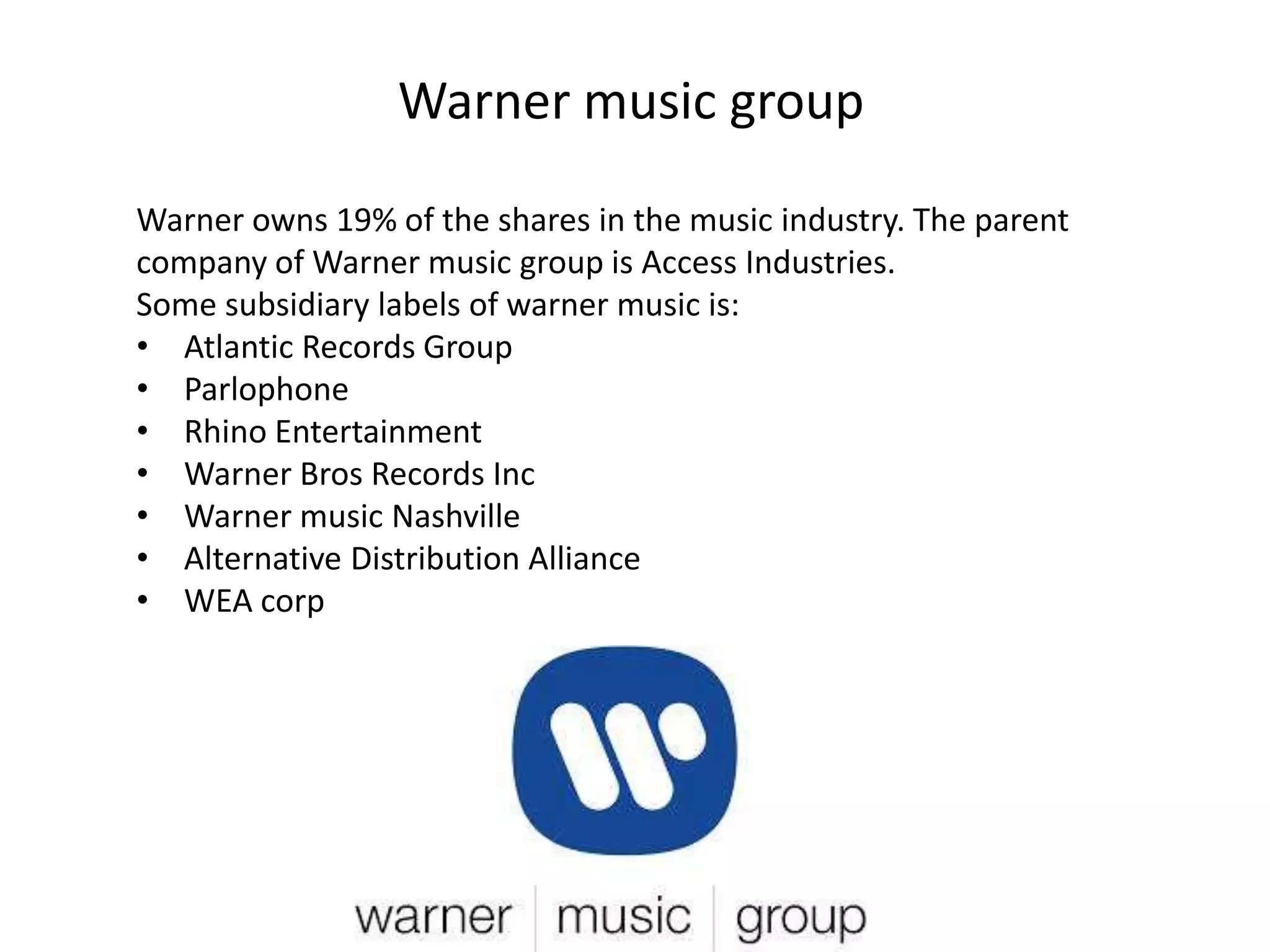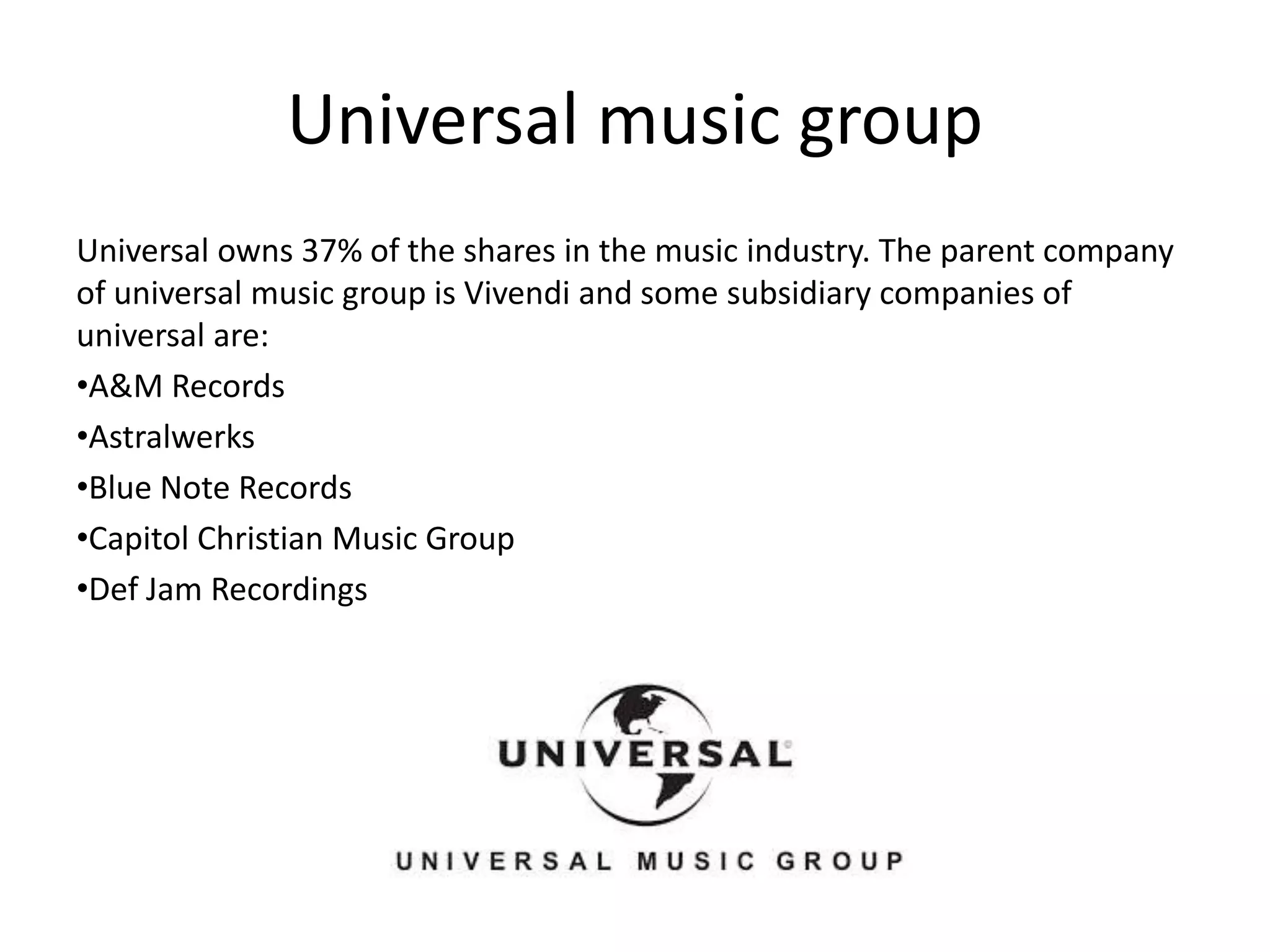When you think about the music you listen to every single day, chances are a lot of it comes from artists connected to a handful of really big companies. These are what we call the major record labels. They have shaped how music gets made, shared, and heard for a very long time. For anyone who loves tunes or dreams of making them, knowing a bit about these powerful groups is pretty helpful, you know?
These labels have been around for quite a while, seeing music go from records to tapes, then CDs, and now all the way to streaming. They've always played a big part in getting artists' voices out there, helping them reach huge audiences. It's like they're the big engines behind many of the songs that become household favorites, giving artists the backing they need to really make a splash. So, in some respects, they are still very much at the heart of the industry.
This article is going to take a closer look at these big names in the music business. We'll chat about what they actually do, who they are, and how they fit into today's fast-paced world of sounds and songs. We'll also consider some of the challenges they face and what the future might hold for them and for artists hoping to make it big. Basically, we'll try to get a better sense of how it all works.
- Kate Middleton Swimwear
- Megan Thee Stallion Super Bowl
- Latto Ice Spice
- Hoka Clifton 9 Wide Womens
- Cn New Year 2022
Table of Contents
- What Are Major Record Labels, Anyway?
- How Do Major Record Labels Shape Careers?
- Who Are the Current Major Record Labels?
- Are Major Record Labels Still Relevant in Today's Music World?
- What Challenges Do Major Record Labels Face?
- Can Artists Really Succeed Without Major Record Labels?
- The Future of Major Record Labels
- A Look at Major Record Labels' Impact on the Industry
What Are Major Record Labels, Anyway?
So, what exactly are these major record labels we hear so much about? Well, they're basically very large companies that sign musical artists, help them record their songs, market those songs to the public, and then distribute the music so people can buy or stream it. They handle a lot of the behind-the-scenes work that helps a musician's work get noticed. Think of them as the big studios and marketing powerhouses that can really push an artist's career forward, you know?
These organizations typically have huge budgets and a lot of staff dedicated to different parts of the music-making process. They have people who find new talent, folks who work on getting songs recorded just right, and teams that figure out how to get the music played on the radio or added to popular playlists. It's a pretty involved operation, actually. They also manage things like getting songs placed in movies or commercials, which helps artists earn more money and get more exposure. They're a big piece of the puzzle, in a way.
For a very long time, these major record labels were the only real path for most artists to reach a wide audience. They had all the connections to radio stations, music stores, and advertising agencies. Without their backing, it was incredibly hard for a musician to become a household name. This gave them a lot of say in what music people heard and what artists became famous. Their influence was, and to some extent still is, really quite significant.
- Tinky Winky And Po
- Wonka Sequel
- Has Leonardo Dicaprio Ever Been Married
- Short Cornrow Braids
- Chasing Summer Vinyl
How Do Major Record Labels Shape Careers?
When an artist signs with one of the major record labels, it often means they get access to resources they wouldn't have otherwise. This includes money to record high-quality tracks, help with writing songs, and even guidance on how to perform better. It's like getting a whole support system built around your musical journey. They provide the funds needed to produce polished albums, which can be a very expensive undertaking for an independent artist.
Beyond the creative side, these labels put a lot of effort into getting the artist's name and music out there. They set up interviews, arrange tours, and spend a lot on advertising. This kind of promotional muscle is something most independent artists just can't match on their own. For instance, they might get your song played on major radio stations or secure a spot on a popular TV show, which can make a musician famous practically overnight. It's a huge advantage, basically.
However, this relationship isn't always smooth sailing, as a matter of fact. Sometimes, artists find that the "major update" of signing to a label can bring its own set of "bugs." They might feel like they lose some creative control, or that the label's vision for their music doesn't quite match their own. It can feel a bit unnatural to have so many people involved in something that started as a very personal expression. There are stories, too, of artists having trouble with updating their image or sound if the label doesn't agree with the direction. It's a trade-off, really, between support and independence.
Who Are the Current Major Record Labels?
Today, the music industry is mostly dominated by what people call the "Big Three" major record labels. These are Universal Music Group, Sony Music Entertainment, and Warner Music Group. Each of them owns many smaller record companies, often called imprints, which specialize in different music styles or work with specific kinds of artists. It's like they're giant umbrella organizations covering a huge variety of sounds. So, you might hear about a band on "Republic Records," but that's actually part of Universal Music Group, for example.
Universal Music Group is considered the biggest of the three. They have a massive roster of artists, from pop superstars to rock legends. Their reach is truly global, with offices and operations all over the world. They've been around for a very long time and have adapted to many changes in how music is consumed. They are, in a way, a cornerstone of the modern music business.
Sony Music Entertainment is another one of the major record labels with a long and storied past. They also represent a wide array of musical talent and have a strong presence across different genres. They've made some very smart moves over the years to stay competitive, especially as the industry shifted to digital formats. They, too, have a huge impact on what we listen to.
Finally, Warner Music Group rounds out the Big Three. While perhaps a bit smaller than Universal or Sony, they are still a very powerful force. They have a history of nurturing groundbreaking artists and have also embraced new technologies to get music to listeners. These three companies collectively hold a huge share of the global music market, which gives them a lot of influence over trends and artist careers. They really are the main players.
Are Major Record Labels Still Relevant in Today's Music World?
With platforms like Spotify, Apple Music, and YouTube, it's easier than ever for artists to share their music without needing a record deal. Many musicians are finding success by putting their songs out themselves, connecting directly with fans online. This has led some people to wonder if major record labels are still as important as they once were. It seems, to some, that the old ways might be breaking down a bit.
However, despite the rise of independent artists, major record labels still offer things that are hard to get on your own. They have the money for big marketing campaigns, the connections to get songs on popular radio stations, and the staff to handle all the complicated legal and business stuff. For an artist looking to become a global phenomenon, that kind of backing is still incredibly valuable. It's a different kind of support, perhaps, but still very much needed for certain goals.
The music world has seen some "major updates" over the last couple of decades, especially with the move from physical albums to streaming. This shift definitely "broke stuff" for many parts of the old music business model. Record labels had to figure out new ways to make money and support artists. They've had their share of "trouble with updating" their strategies, but they've also invested heavily in digital distribution and data analysis to understand what listeners want. So, while their role has changed, they're still very much in the game, trying to keep up with the times.
What Challenges Do Major Record Labels Face?
Even though they are big and powerful, major record labels have their own set of difficulties. One of the biggest has been dealing with how people consume music now. When everyone started streaming songs instead of buying them, the amount of money artists and labels made from each listen went down significantly. This meant they had to figure out new ways to make money and stay profitable. It's been a tough adjustment, honestly, for the whole industry.
Another challenge comes from the sheer amount of music available. With so many artists putting out songs every day, it's harder for any single artist, even one backed by a major label, to stand out. The competition for listeners' attention is incredibly fierce. This means labels have to work even harder to promote their artists and find new ways to cut through the noise. It's a bit like trying to find a specific book in a giant library that's always getting new books added.
There's also the constant need to adapt to new technologies and trends. Just like how software needs constant "updates" to fix "bugs" and add new features, the music business is always changing. Major record labels have to be quick to understand new social media platforms, new ways people discover music, and new types of content. If they fall behind, they risk losing their edge. This constant need to "update" their approach can be a source of trouble, as it means they have to be very flexible and willing to change old habits.
Can Artists Really Succeed Without Major Record Labels?
These days, it's definitely possible for artists to find success without signing with one of the major record labels. Many musicians are building strong fan bases and making a living by releasing their own music through independent distributors and promoting themselves on social media. They can keep all the creative control and a much larger share of the money they earn. For some, this feels like a much more natural way to make music, free from the pressures of a big company.
However, reaching a truly global audience and becoming a household name is still a very different story. While independent artists can do well, the marketing muscle, distribution networks, and industry connections that major record labels offer are still unmatched for breaking through to the mainstream. Getting your song on a big movie soundtrack or performing at a huge awards show often still requires the kind of backing only a major label can provide. It's a bit of a balancing act, you know?
For some artists, the idea of a "major update" to their career by signing with a big label might seem appealing, but they worry about what might "break" in the process. They might be concerned about losing their unique sound or having to compromise on their artistic vision. It's a personal choice, really, whether the benefits of a major deal outweigh the potential downsides of less control. Some artists have had trouble with updating their image or sound to fit what a label wants, which can feel quite unnatural to their artistic spirit.
The Future of Major Record Labels
So, what's next for these big music companies? It seems clear that they are not going anywhere, but they are certainly changing. They are investing a lot in technology, like using data to find new artists and understand listener habits better. They are also looking for new ways to make money beyond just selling songs, like through merchandise, live events, and even partnerships with tech companies. It's a very active period of adjustment for them.
We might see major record labels becoming more like service providers for artists, offering specific help with things like marketing or distribution, rather than taking a huge chunk of everything. They might work more closely with independent artists or offer different kinds of deals that give musicians more control. This kind of flexibility could help them stay relevant in a world where artists have more options than ever before. It's almost like they're trying to "fix bugs" in their old business model, you know?
Ultimately, the major record labels will likely continue to play a big part in the music industry because they have the capital and the infrastructure to take big risks on new talent and push them to a global scale. They are constantly trying to "update" their strategies to keep up with how people listen to music and how artists want to build their careers. Their ability to adapt will decide just how big their influence remains in the years to come. They are certainly trying to stay ahead of the curve, as a matter of fact.
A Look at Major Record Labels' Impact on the Industry
No matter how much the music world changes, the impact of major record labels is undeniable. They have discovered and promoted countless artists who have gone on to become household names, creating the soundtracks to our lives. Their investments have allowed for the creation of high-quality recordings and music videos that would otherwise be impossible for most artists to produce. They've really been instrumental in shaping popular culture.
They also play a big part in how music is organized and protected. They work to make sure artists get paid when their music is used, and they help fight against illegal sharing of songs. This kind of work is very important for keeping the music business healthy and fair for everyone involved. Without their efforts, it might be much harder for artists to make a living from their craft. So, they do provide a lot of behind-the-scenes support that benefits the whole industry, honestly.
Even as independent music grows, the major record labels continue to set trends and influence the direction of popular music. Their sheer size and resources mean they can still make a huge splash when they sign a new artist or release a big album. They are, in a way, still the big ships guiding the fleet, even if many smaller boats are now sailing alongside them. Their legacy and ongoing presence are a testament to their enduring influence on how music reaches our ears.
This article has explored the significant role of major record labels in the music industry, from their core functions in artist development and distribution to their current challenges in a rapidly changing digital landscape. We've discussed who the main players are, how they shape artists' careers, and whether they remain relevant in an era of independent music. We also touched upon the difficulties they face and what their future might look like, along with their lasting impact on how music is created and shared globally.
- Steve Haley
- King Charles Inn Sc
- Ross Travis Travis Kelce
- Meaghan Rain
- Martin Luther King Quotes About Equality


